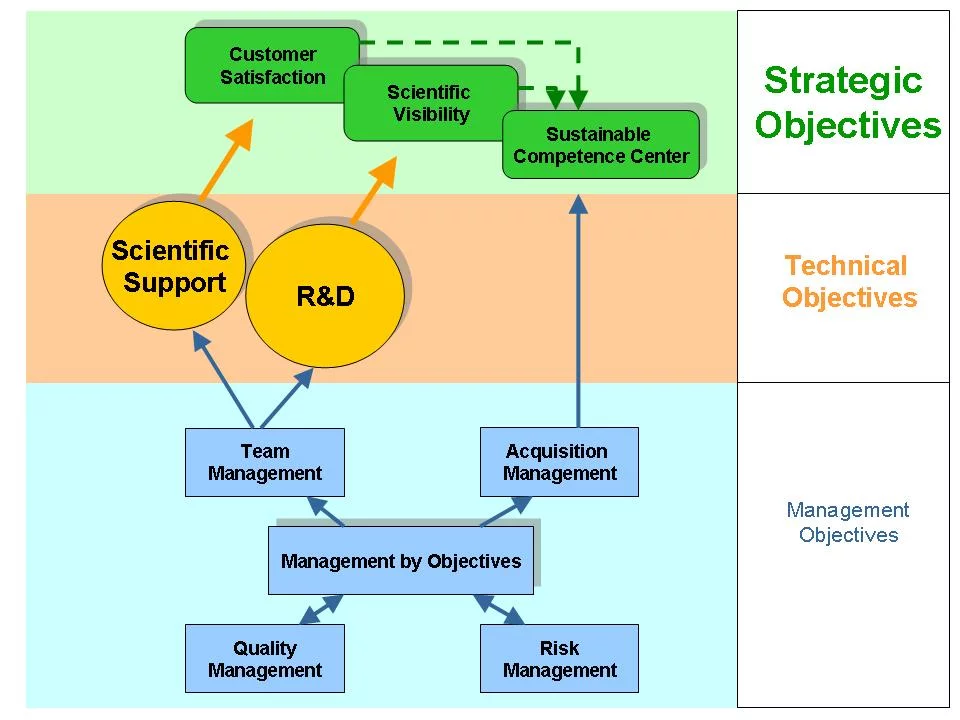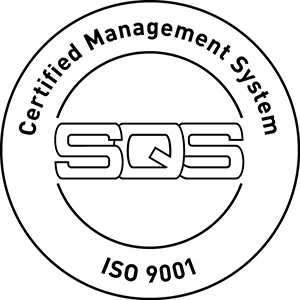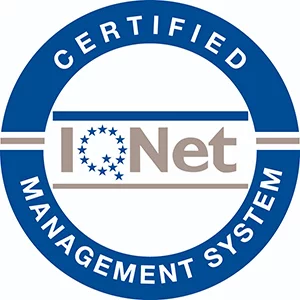STARS applies a “Stratified Strategy Formulation” concept that includes “Management Objectives”, “Technical Objectives” and “Strategic Objectives”.
The principles of stratification are that objectives in an underlying layer are defined in order to achieve the objectives of the upper layers.
Strategic Objectives
The strategic objectives are the requirements that will ensure that STARS fulfill its mission in a long-term and sustainable manner.
Customer Satisfaction
STARS must fulfil its commitments towards all Customers in order to maintain long-term confidence as a reliable Scientific Support center. This requires to always a) deliver what was agreed upon; b) meet or surpass the expectations regarding the technical quality and in terms of providing directly useful findings; c) ensure that due priority is given to maintain and/or develop modelling and simulation capabilities tailor-sewed to answer specific needs of high relevance to the partners.
Scientific Visibility
STARS must fulfil its scientific commitments towards PSI/NES/LRS and maintain its long-term role as a valuable and independent research unit. This requires to a) play a visible and leading expert role in the international research community; b) continuously strengthen the translation of the research findings into high quality and innovative scientific publications; c) contribute actively in national nuclear education programs.
Sustainable Competence Center
To fulfil its mission as a TSO unit and its competitiveness as a front-edge nuclear safety competence and education center, a key target is to maintain a well-trained team of qualified experts with adequate provisions for sufficient redundancy. Another key target is to provide room for innovative, including high-risk and/or basic research, that will allow the STARS capabilities to remain constantly in-line and synchronized with the latest advances and trends in the international research community related to LWR simulation methodologies. Through this, STARS can also continue to be attractive for students and guest scientists.
Technical Objectives
To achieve the strategic objectives, the “Technical Objectives” play the most important role. These objectives guide the planning, initialization and realization of the concrete research and support activities that will be conducted in order to fullfill the STARS mission in full alignement to the PSI/NES/LRS strategic goals. Currently, this currently translate into the following strategic technical goals.
- Ensure continuous development, validation and maintenance of up-to-date Swiss reference best-estimate (BE) safety analysis methodologies in each technical area and establish static/dynamical coupling schemes;
- Deploy complementary higher-fidelity higher resolution methods in each technical area and integrate these into multi-physics and/or multi-scale (MPMS) computational schemes
- Develop uncertainty quantification (UQ) methodologies for the BE analyses and/or the MPMS schemes;
- Complement the UQ by sensitivity analysis (SA) methodologies for screening of the most relevant uncertainty sources, for model calibration against experiments, for enhanced understanding of physical processes/phenomenology and/or for identification of experimental data needs.
- Consolidate the strategies, including the design of new simulation-experimental programs, for the validation of BE and/or MPMS schemes with UQ/SA methodologies.
Management Objectives
The "Management Objectives” are aimed at establishing systematic, well-defined working processes and provide the adequate infrastructure as well as organization such as to facilitate and support the team towards reaching the “Technical Objectives” and to steer in that manner, STARS towards achieving the “Strategic Objectives”. Thereby targets are set along five main components.
- Management by Objectives is aligned to the PSI procedure requiring that individual targets be set and evaluated on a yearly basis.
- Team Management objectives are set and aimed at ensuring training and development plans of the individuals as well as to ensure proper measures for the consolidation of team work.
- Acquisition Management objectives are set and aimed at handling the continuous establishment and/or renewal of support contracts and/or research proposals.
- Risk Management objectives are set with focus on competence management, know-how preservation, publication guidelines as well as preservation of independence and identification/mitigation of conflict-of-interests.
- Quality Management objectives are set on the working procedures and on performance targets in a closed feedback loop aimed at continuous enhancements.
As part of the risk management, special attention is given to Conflict-of-Interest (COI) management. To that aim, STARS systematically applies a specific COI procedure defined in its certified PMS quality management system and which integrates national requirements along with being continuously aligned to updates of international standards (e.g. IAEA, ETSON), the objective being to identify and prevent any COI risks associated with the program activities, specially during the acquisition phase when new contracts or agreements are being elaborated with partners.
Quality Management
NES Open positions
Current job openings in the PSI Center for Nuclear Engineering and Sciences




